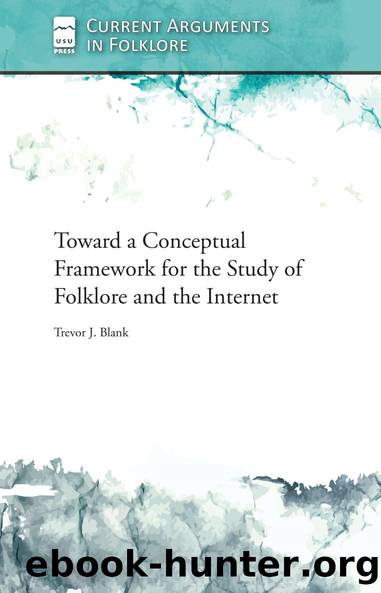Toward a Conceptual Framework for the Study of Folklore and the Internet by Trevor J. Blank

Author:Trevor J. Blank [Blank, Trevor J.]
Language: eng
Format: epub
Tags: Social Science, General, Folklore & Mythology
ISBN: 9780874219456
Google: RnPgCwAAQBAJ
Amazon: B00M9QVW9Q
Barnesnoble: B00M9QVW9Q
Goodreads: 24764200
Publisher: Utah State University Press
Published: 2014-06-14T00:00:00+00:00
Notes
* * *
1. The ethnographic research I was referring to at the time revolved around collecting the humorous vernacular responses to the death of Michael Jackson on June 25, 2009 that colorfully circulated both online and in oral traditions thereafter. This work was eventually published in the journal Midwestern Folklore (Blank 2009c) and later expanded upon in The Last Laugh (Blank 2013a, 83â98). Return to text.
2. Additionally, this scholar demanded: âHow can you claim to have a legitimate informant if you donât know who they âreallyâ are as a person in their day-to-day lives?â Such concerns were common as researching folklore and the Internet gradually garnered more widespread acceptance within the discipline. The evolution of a field is never without its strains. Return to text.
3. During my early years of graduate school, most of my professors had no vested interest in my research on folklore and the Internet, which was then perceived as a âfringeâ area of inquiry. Thus, in the context of this fateful interactionâwhere my work and core interests in folklore were under direct attackâI already knew that I was in the minority, albeit a growing one. Therefore, I chose to forgo arguing with an unconvertible audience. In that moment, my interests painted me as a misguided, idealistic graduate student who had just been âschooledâ by an accomplished folklorist. Fortunately, as time has proven, those concerns about the merits of folkloristic fieldwork on the Internet proved unfounded. In addition to the scholars cited in Blank (2009a, 2009b), see also Blank (2012a, 2013a, 2013b, 2014, 2015); Buccitelli (2012, 2013); Ellis (2012); Frank (2004, 2011); Howard (2011); Kaplan (2013); and Miller (2012), among others, for additional applications of and theoretical work on cyberethnography in the study of folk culture and human behavior online (see also Blascovich and Bailenson 2011). And one final point in recalling this interaction: if there is one thing I have learned in my college teaching career, it is that the chance to foster the intellectual development of motivated and imaginative students is a rare gift that should always be undertaken with pride, respect, and unmatched encouragementâeven when dealing with âfringeâ areas of inquiry. Innovation will be the only thing to reliably perpetuate the investigation of new and evolving folklore in the twenty-first century. Return to text.
4. Likewise, I should note that my colleagueâs claims further reveal the prevailing notion of the day: that folklore surfaces most authentically in face-to-face settings and via oral transmissionâa contention that has seen its share of proponents and challenges in recent years. To illustrate this dichotomy, see Bill Iveyâs 2007 AFS Presidential Address (Ivey 2011) and Howard and Blankâs (2013) ensuing response for a pointed critique of anti-modern sentiments in folkloristics such as the ones espoused by Ivey. See also Blank and Howard (2013) for additional perspectives on folklore, tradition, and modernity. And see Blank (2009a, 8, 10â11)âalso reprinted in this monographâfor specific discussion about folklorists wrestling with notions of the âfieldâ and fieldwork, including what renders the endeavor legitimate. Return to text.
Download
This site does not store any files on its server. We only index and link to content provided by other sites. Please contact the content providers to delete copyright contents if any and email us, we'll remove relevant links or contents immediately.
Cecilia; Or, Memoirs of an Heiress — Volume 1 by Fanny Burney(32544)
Cecilia; Or, Memoirs of an Heiress — Volume 2 by Fanny Burney(31940)
Cecilia; Or, Memoirs of an Heiress — Volume 3 by Fanny Burney(31928)
The Great Music City by Andrea Baker(31915)
We're Going to Need More Wine by Gabrielle Union(19033)
All the Missing Girls by Megan Miranda(15941)
Pimp by Iceberg Slim(14481)
Bombshells: Glamour Girls of a Lifetime by Sullivan Steve(14050)
For the Love of Europe by Rick Steves(13890)
Talking to Strangers by Malcolm Gladwell(13344)
Norse Mythology by Gaiman Neil(13343)
Fifty Shades Freed by E L James(13231)
Mindhunter: Inside the FBI's Elite Serial Crime Unit by John E. Douglas & Mark Olshaker(9315)
Crazy Rich Asians by Kevin Kwan(9275)
The Lost Art of Listening by Michael P. Nichols(7488)
Enlightenment Now: The Case for Reason, Science, Humanism, and Progress by Steven Pinker(7306)
The Four Agreements by Don Miguel Ruiz(6744)
Bad Blood by John Carreyrou(6610)
Weapons of Math Destruction by Cathy O'Neil(6263)
